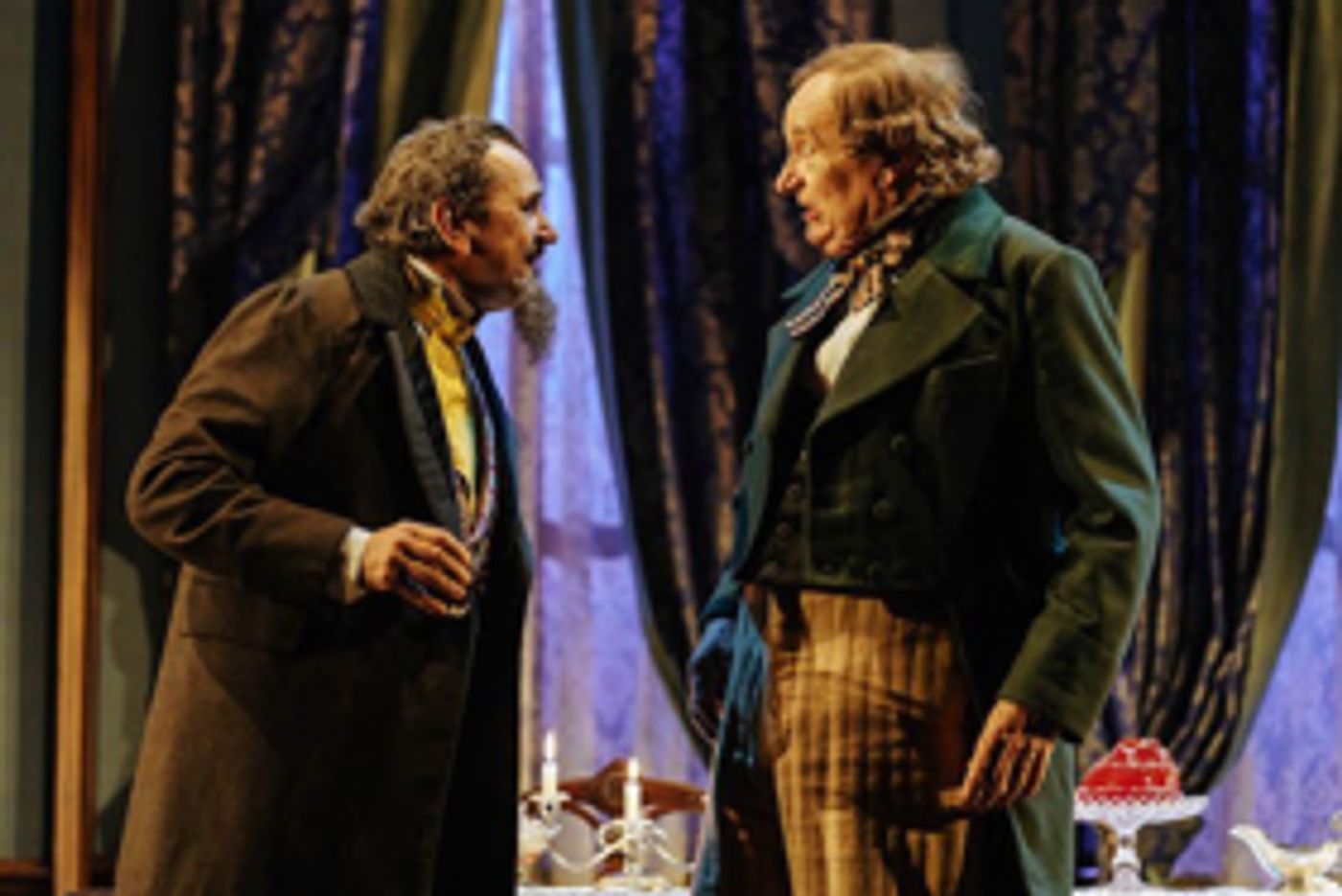Review: A VERY VERY VERY DARK MATTER, Bridge Theatre

![]() Hot off award-winning film Three Billboards Outside Ebbing, Missouri, and reunited with Matthew Dunster, who directed his hit Hangmen, Martin McDonagh brings his latest to the Bridge - quite a coup for Nick Hytner. Yet this provocative take on Hans Christian Andersen, and on the nature of storytelling, takes too scattershot an approach to fully land.
Hot off award-winning film Three Billboards Outside Ebbing, Missouri, and reunited with Matthew Dunster, who directed his hit Hangmen, Martin McDonagh brings his latest to the Bridge - quite a coup for Nick Hytner. Yet this provocative take on Hans Christian Andersen, and on the nature of storytelling, takes too scattershot an approach to fully land.
We begin in 19th-century Copenhagen, and Anna Fleischle's Gothic design immediately earns some of those "very"s from the title: an array of decidedly creepy suspended puppets haunting Andersen's attic - and quite possibly the audience's nightmares. A pre-recorded narration from Tom Waits (!) introduces McDonagh's premise: that Andersen kept a Congolese pygmy imprisoned for decades, and she is the real author of his grim tales.
The great author is revealed as a buffoonish fraud, basking in adulation ("Fireworks, for me?!"), using cod-childish language (fiction writing is "makey-uppy"; the Press Man is a "write-that-downer"), most adept at sadistic carpentry and ruthlessly editing out the bits he doesn't like from his captive's stories ("like a German theatre director").
The latter is one of many creative in-jokes - along with agents, fan mail and the journalist quite literally getting it in the neck - but McDonagh's equal-opportunities-offending macabre humour extends to everyone, including Andersen himself, revealed as the guest from hell when he descends on Charles Dickens in London.
There are additional surreal elements, like a pair of time-travelling Belgians who were involved in the massacre of millions in the Congo under King Leopold II's genocidal rule. This opens out the play into an allegory of Western colonial destruction and cultural appropriation - as well as interrogating those self-aggrandising, and artfully selective, Victorian storytellers.
McDonagh's anarchic approach to literary giants is itself a clear riposte to their weighty reputations; his Dickens, too, has a dark secret, plus a filthy mouth, a wandering eye, and a tendency to lie. Topically, the play asks who we choose to memorialise, and how far that myopic canonisation might be from the reality.
Yet this breathless work is too brief, and overstuffed, to do these big ideas justice - let alone its characters. McDonagh often resorts to shock tactics, whether button-pushing language or violence, but without a clear sense of what this is all in service of; unlike, say, The Pillowman, which more thoughtfully explored the psychology, responsibility and agony of storytelling.
Jim Broadbent is as charismatic as ever, but slightly wasted on the brutish, egocentric Andersen and his endless un-PC one-liners. Ditto Phil Daniels and Elizabeth Berrington as a sweary Mr and Mrs Dickens - though both are enjoyable as the grouchy host and clued-up spouse respectively. The whole visit had meatier dramatic treatment in Sebastian Barry's play Andersen's English.
Faring best is American actress Johnetta Eula'Mae Ackles as the captive woman Andersen calls "Marjory" - bringing tireless grace, gravitas and attentiveness to this symbol of oppression, who hopes to bloom from figuratively ugly duckling to powerful avenging swan.
She also demonstrates how vital the stories are as a means of expression, connection and maintaining a sense of identity. But how callously Andersen erases her there, too - so much for The Little Black Mermaid.
The play works best when it focuses in on that level of detail, and Dunster's vivid production provides evocative elements, particularly through James Maloney's music. But overall, this work - which Waits's narration suggests we could call "a puzzle, or...a poem" - is too generalised, and its satirical methods too blunt.
There's also an uneasiness about a revered white male playwright (in a chic London theatre) questioning whose voice is valued, and who is allowed to claim ownership of folk tales. However radical the intention, the work's context is anything but.
The very very very big question winds up being whether McDonagh's play was rushed to stage, prioritising his current commercial appeal over dramaturgical rigour, or whether this is a bold creative risk taken by an unsubsidised theatre. It's a postscript that will be decided by audiences - and by that same winding literary history.
A Very Very Very Dark Matter at Bridge Theatre until 6 January, 2019
Photo credit: Manuel Harlan
Reader Reviews
Videos

